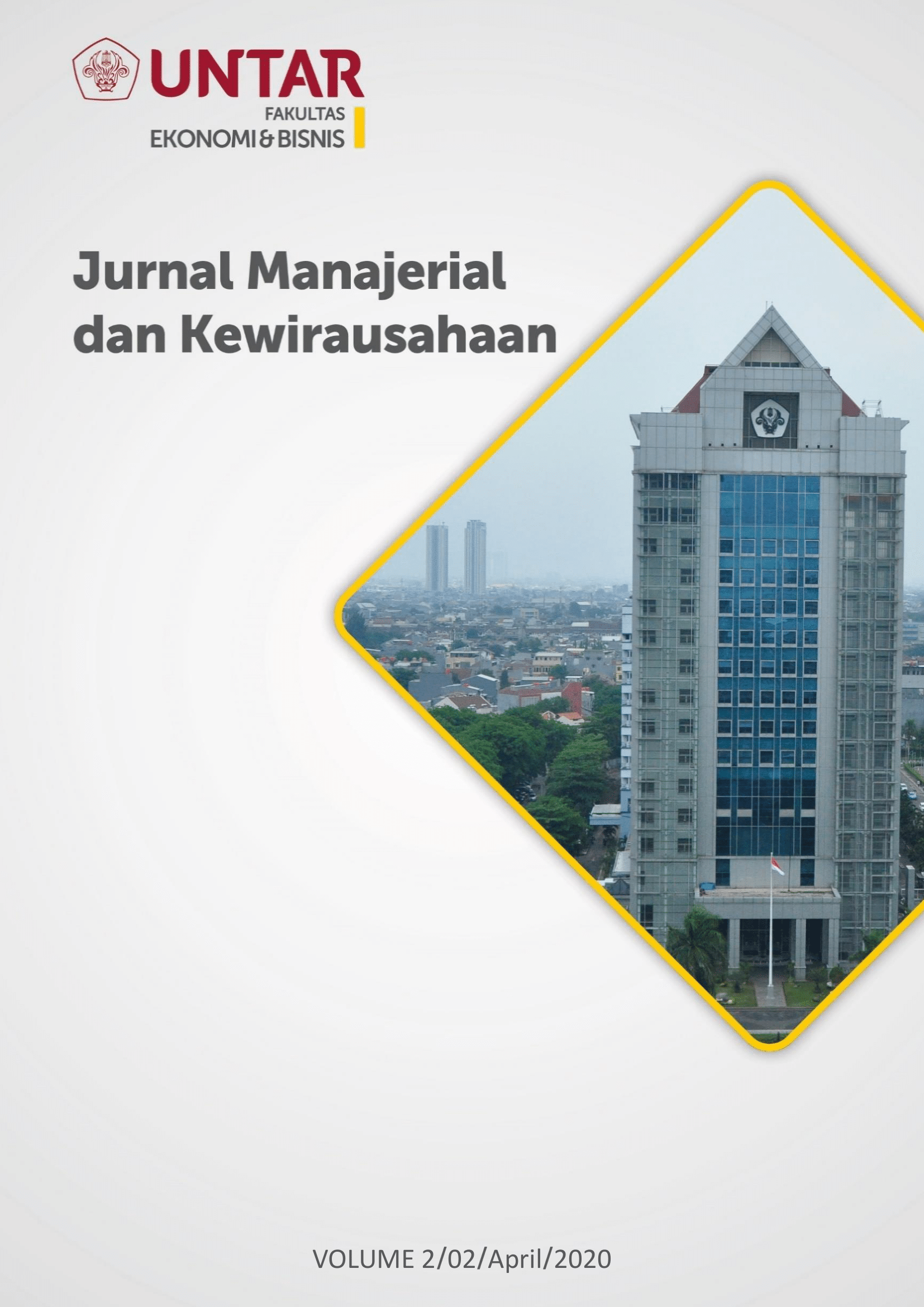Pengaruh Orientasi Pasar Dan Orientasi Kewirausahaan Terhadap Kinerja UMKM Di Jakarta Barat
Main Article Content
Abstract
The purpose of this paper is to investigate the impact of market orientation (MO) and entrepreneurial orientation (EO) on business performance among small retailers. In particular, the goal is to understand and determine to what extent MO and EO influence firm performance directly, and to what extent MO and EO are connected to performance. The developed conceptual model is tested using partial least square (PLS) using a sample of 30 small retailers. The result of the PLS model shows that both MO and EO act as a basis for improved business performance among small retailers. Based on the research findings, it can be argued that both MO and EO fully unlock their value-creating potential among small retail firms. This study has provided new insights regarding the impact of MO and EO on business performance in the context of small retail firms. In particular, the study has contributed to the literature by demonstrating the routes through which MO and EO impact on performance.
Tujuan dari makalah ini adalah untuk menyelidiki dampak orientasi pasar (MO) dan orientasi kewirausahaan (EO) pada kinerja bisnis di antara pengecer kecil. Secara khusus, tujuannya adalah untuk memahami dan menentukan sejauh mana MO dan EO mempengaruhi kinerja perusahaan secara langsung, dan sejauh mana MO dan EO terhubung dengan kinerja. Model konseptual yang dikembangkan diuji menggunakan partial least square (PLS) menggunakan sampel 30 pengecer kecil. Hasil model PLS menunjukkan bahwa baik MO dan EO bertindak sebagai dasar untuk meningkatkan kinerja bisnis di antara pengecer kecil. Berdasarkan temuan penelitian, dapat dikatakan bahwa MO dan EO sepenuhnya membuka kunci potensi penciptaan nilai mereka di antara perusahaan ritel kecil. Studi ini telah memberikan wawasan baru mengenai dampak MO dan EO pada kinerja bisnis dalam konteks perusahaan ritel kecil. Secara khusus, penelitian ini telah berkontribusi pada literatur dengan menunjukkan rute melalui mana MO dan EO berdampak pada kinerja.
Article Details
This work is licensed under a Jurnal Muara Ilmu Ekonomi dan Bisnis Creative Commons Attribution-ShareAlike 4.0 International License.,/p>
References
Aritonang, R. L. (2007). Teori dan Praktik Riset Pemasaran. Bogor.
Day, G. S., & Wensley, R. (1988). Assessing Advantage: A Framework for Diagnosing Competitive Superiority. Journal of Marketing, 1-20.
Idar, R., & Mahmood, R. (2011). Entrepreneurial and Marketing Orientation Relationship to Performance: The SME Perspective. Interdisciplinary Review of Economics and Management 1
Jaworski, B., & Kohli, A. (1993). Market Orientation: antecedents and consequences. Journal of Marketing, 53-71.
Knight, G. (2000). Entrepreneurship and marketing strategy: the SME under globalization. Journal of International Marketing, 12-32.
Kohli, A., & Jaworski, B. (1990). Market Orientation: The Construct, Research Propositions, and Managerial Implications. Journal of Marketing, 54(2), 1-18
Narver, J., & Slater, S. F. (1990). The Effect of a Market Orientation on Business Profitability. Journal of Marketing, 54(4), 20-35.
Ngo, L., & O'Cass, A. (2012). performance implication of market orientation, marketing resources, and marketing capabilities. Journal of marketing management, 173-187.
Pelham, A. M., & Wilson, D. T. (1996). A Longitudinal Study of the Impact of Market Structure, Firm Structure, Strategy, and Market Orientation Culture on Dimensions of Small-firm Performance. Journal of the Academy of Marketing Science, 24(1), 27-43.
Sugiyono. (2007). Metode Penelitian Kuantitatif Kualitatif dan R&D. Bandung: Alfabeta.
Tenenhaus, M. V. M. (2005). PLS path modeling. Computational Statistics & Data Analysis, 159–205.
Utama, L. (2018). Pengaruh sumber daya pemilik waralaba terhadap kinerja penerima waralaba dengan orientasi kewirausahaan Sebagai mediasi.
Wiklund, J., & Shepherd, D. (1999). The Sustainability of the Entrepreneurial Orientation Performance Relationship. Entrepreneurship Theory and Practice, 24(1), 37-48.
Zahra, S. A. (1991). Predictors and Financial Outcomes of Corporate Entrepreneurship: An Exploratory Study. Journal of Business Venturing, 6(4), 259-285. Doi: 10.1016/0833-9026(91)90019-A



